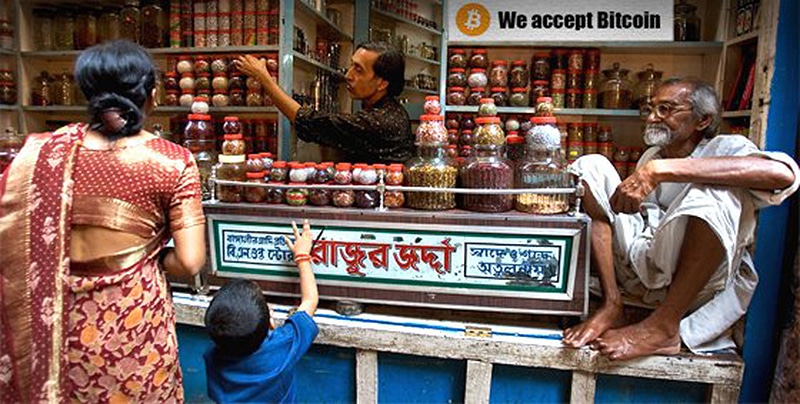Future of money or a fraud? Deconstructing Bitcoin in the region.

By Asia News Network, NEW DELHI
Bitcoin’s popularity in Asia has had a positive influence on other alternative cryptocurrencies such as ethereum and litecoin. Clearly there is a great demand for such digital money, even though its volatility hurts.
Asia has reacted both warmly and violently to the rising interest and craze in cryptocurrencies.
Asian regulators have either outrightly banned the use of the most popular cryptocurrency – mostly bitcoins – in their respective countries, or issued warnings to people against its pitfalls. Japan is the only exception in Asia – having legalised its use last year.
Indian superstar Amitabh Bachchan made his millions (US$100 million) in record time and lost them too within a week, the Statesman reported. His example has come in handy to warn those reposing blind faith in the future of cryptocurrency.
On the other hand, Mukesh Ambani, India’s richest man, who is arguably Asia’s richest too, and who transformed India’s telecom sector with his Reliance Jio Network is reportedly contemplating floating another version of the cryptocurrency – JioCoin.

What is Bitcoin?
A cryptocurrency is a virtual currency which is encrypted and anonymous, making it secure and hard to track. It has no physical manifestation and exists only as a unique string of numbers and characters in the memory of computers. These currencies are traded on online exchanges only geared towards cryptocurrencies, reports Dawn.
Bitcoin was the first cryptocurrency which was started in 2009 by an anonymous group or person who go/goes by the name of Satoshi Nakomoto, who vanished from the online community in 2010.
What makes Bitcoin unique is that unlike conventional currencies, no central bank or government issues cryptocurrencies and it is not legal tender – you cannot use it to pay your taxes for example. Instead the value and volume of transactions all depend on the community that trades in them. Like physical currencies, however, digital currencies are backed by trust. Whereas paper currencies require their users to trust that national state banks will stand by the value invested in them, cryptocurrencies require a more dispersed form of trust – that their algorithm will prevent fraud and in the demand and supply from other users.
Bitcoin can also be used anonymously since unlike credit cards or a bank account, there is no associated address or ID registered with your Bitcoin account — and this is all part of the appeal of cryptocurrencies. However, Bitcoin isn’t as anonymous as its fans and suspicious authorities state — it can be possibly traced to you through your IP address, service provider or spending patterns for instance.
There are currently 16.78 million Bitcoins in circulation with a limited number of new Bitcoins added every day. And anyone with a high-powered computer and some know-how can obtain these. Bitcoins are ‘mined’ by powerful algorithm-crunching computers which ‘discover’ new bitcoins – essentially the solving of complex mathematical puzzles through computing power. These are, in turn, validated by the ‘blockchain’ – a virtual grid containing nodes representing users that act as the collective validation system.
Unfortunately, mining Bitcoins requires a lot of electric power. According to the Bitcoin Energy Consumption Index, 10 US households can be powered for a day by the energy consumed by a single Bitcoin transaction.

What are the risks?
Most financial experts consider cryptocurrencies as highly speculative instruments. This is because they are not backed by any asset or issuer. The valuation of cryptocurrencies is not transparent and there is little information to help consumers gauge the fair value, the Straits Times reported.
At the same time, the prices of cryptocurrencies are highly speculative and can fluctuate greatly within a short period of time.
There is a high risk of a sharp reduction in prices. In the worst-case scenario, the cryptocurrency could be rendered worthless, and investors run the risk of losing all their capital.
Only time will tell if cyrptocurrency is a fraud or our collective future.

Thailand
According to a report in the Nation, in Thailand, the bitcoin frenzy is still in the early stage, with a few cases of potential frauds being pursued by the Department of Special Investigation.
In these cases, innocent investors have been lured into investing in bitcoin and other digital units with a promise of lucrative returns. These cases, which are essentially Ponzi money schemes, are illegal under Thai law, even though bitcoin and the like are not outlawed at this stage.
In addition, some Thai establishments, such as coffeeshops and bistros, have offered to accept bitcoin at their own risk due to their perceived trendiness and the entrepreneurs’ personal obsessions with the new currencies.
India
In India, there are at least 15 bitcoin exchange forums, with the majority being set up over the past two years. According to investigation agencies, with the demand and price of cryptocurrencies on the rise, cyber criminals have found innovative ways to dupe those looking to invest.
Meanwhile, the Indian government has formed a committee to fast track the process of making a law to regulate trade of cryptocurrencies such as bitcoins in the country. India’s main concern is to ensure clean money is being used to trade, and to prevent the misuse of cryptocurrencies by terror groups and other anti-national elements.
Amidst this, cryptocurrency dealer Pluto Exchange has announced the launch of India’s first mobile application for transacting in virtual currencies.
Other Asian countries have been more harsh.
Indonesia
Bank Indonesia (BI) teamed up with the National Police to prevent transactions using cryptocurrency bitcoin in Bali after the central bank declared it an illegal form of payment in Indonesia, the Jakarta Post reported.
The country has warned against owning, selling and trading in cryptocurrency.
“Owning virtual currencies is very risky and inherently speculative,” the central bank said in a statement. The digital tokens “are prone to forming asset bubbles and tend to be used as method for money laundering and terrorism funding, so it has the potential to affect financial-system stability and harm the public.”
The move highlights the challenge faced by regulators as they seek to manage potential risks from the global cryptocurrency mania while lacking the authority to prohibit its use, Bloomberg reported.
Pakistan
The Pakistan government has outlawed cryptocurrency and the State Bank of Pakistan’s official stance is that it does not intend to legalise bitcoins or cryptocurrencies in the future, the Dawn reported.
However, this hasn’t stopped an underground exchange of cryptocurrencies from mushrooming in Pakistan. One can trade in bitcoins on websites, Facebook and WhatsApp among other mediums.
The other hurdle for Bitcoin is its volatility. Although initially put forward as an eventual global substitute for sovereign currency, speculation saw its value jump more than 1900 percent in 2017 – at the beginning of the year its value was a mere US$1,000 – only to fall to below US$12,000 and then recover to around US$15,000 in a matter of days in December.
Bitcoin’s popularity has had a positive influence on other alternative cryptocurrencies such as ethereum and litecoin and given birth to a whole host of new cryptocurrencies. Clearly there is a great demand for such digital money. Each one has tried to differentiate itself with new features: ZCASH, DASH and Monero lend an extra layer of anonymity, even more than other ‘cryptos’.
Then there are cryptocurrencies that are geared towards specific uses. Ripple, for example, has been tailor-made to facilitate banking transactions. Filecoin and Siacoin are meant to focus on monetary exchanges on distributive storage while even the fast-food chain Burger King is coming up with its own cryptocurrency. There even are a few rappers who have issued their own cryptocurrency.
Blockchains, the underlying technology that powers Bitcoin and other cryptocurrencies, shows more promise on the acceptability and legalisation side.
Malaysia
While some merchants are still hesitant to accept cryptocurrency, one businessman in Sabah has signed and sealed the sale of a piece of land in Sabah’s east coast Libaran Island using Bitcoin, the Star has reported.
The deal, worth half a Bitcoin (about RM38,000), was transacted between one of Sabah’s top tourism entrepreneurs Alexander Yee and his friend Polycarp Chin.
Malaysia’s Second Finance Minister Johari Abdul Ghani said recently that there would be no blanket ban on cryptocurrencies as such action would only curb innovation and creativity in the financial sector.
South Korea
The Korea Herald quoted a Yonhap report saying nearly 2 million South Koreans are estimated to have used cryptocurrency apps in the past week (Jan 7-15).
A total of 1.96 million people may have used apps that allow them to handle digital currencies, such as bitcoin and ethereum, last week, up from 140,000 tallied between Oct. 30 and Nov. 5, according to data from WiseApp, an application analytics company.
Cryptocurrencies have rapidly gained popularity in recent weeks among South Korean investors hoping to make quick money, prompting the government to announce a plan to rein in the frenzy over virtual currency in Asia’s fourth-largest economy.
Last week, the Ministry of Justice announced that the government is preparing a bill to ban cryptocurrency exchanges at home.
Nepal
In an opinion piece the Kathmandu Post suggested that instead of banning bitcoins, Nepal could study its underlying technology and could create a blockchain to form a regulated digital currency of its own.
“Digital currencies are the future of transactions. Humankind cannot remain reliant upon paper money and metal coins. In an era of science where there are possibilities of colonising and terraforming distant planets, paper money and metal coins could be huge hurdles for humans if they are to be used as modes of transaction for any exchanges. The digital world is in need of digital money,” wrote a contributor for the Kathmandu Post.
Bangladesh
Bangladesh Bank has banned the use of Bitcoin by issuing a circular on its website. The circular reads that Bitcoin is not an authorised and legal currency in any other country in the world.
“Transaction with this currency may cause a violation of the existing money laundering and terrorist financing regulations,” the circular reads.
Besides, these currencies do not conform to Foreign Exchange Regulation Act, 1947, Anti Terrorism Act 2009 and Money Laundering Prevention Act, 2012, the notice adds.
Bangladeshis have been asked to refrain from performing, assisting and advertising all kind of transactions through the virtual currencies like Bitcoin to avoid financial and legal damages.
China
The nation’s top financial regulator has suggested that local governments encourage bitcoin miners to gradually reduce production of the cryptocurrency until finally quitting the business, a signal of an upgraded campaign to crack down on financial risks arising in the fast-developing fintech sector, China Daily reported.
A senior official with the People’s Bank of China, the nation’s central bank, said a notice had been sent recently to local governments, asking bitcoin mining companies to “orderly exit” the business.
The notice is issued by the Office of the Special Rectification Work Leadership Team for Internet Financial Risks, which was set up by the State Council in April 2016 with a leader from the central bank. The special team also regulates the country’s cryptocurrency business.
Some bitcoin miners told China Daily that they had received notices from local governments to limit electricity consumption, and some of them had already moved part of the mining business overseas, to some locations with relatively cheaper costs for land rental and electricity, such as Mongolia.
The move is an indication that the monetary authority will further tighten regulation on bitcoin, after it closed all bitcoin trading platforms in the country last year, amid concerns that the cryptocurrency may boost harmful speculation.
Japan
Unlike China and South Korea, whose regulators have clamped down hard on the cryptocurrency, Japan has welcomed it with open arms.
Bitcoin is recognised as legal tender in the world’s third-biggest economy and nearly one third of global bitcoin transactions in December were denominated in yen.
According to various media reports, in April, Japan passed a law recognising bitcoin and other virtual currencies as legal tender while also stressing the need for transparency and financial stability.
The virtual currency bitcoin has recently seen its price skyrocket. A growing number of experts are saying the price increases are a bubble with little real economic foundation that will eventually burst and bring the price crashing down. Individual Japanese bitcoin investors – of whom there seem to be many – should take extra caution in handling the digital currency, the Japan News reported.
The price for 1 bitcoin in January 2017 was about US$1,000, but it rose dramatically during the year, briefly touching a high above US$19,000 in December.
It is difficult to predict how the bitcoin market will fluctuate from now on, but there is no mistaking the fact that it is becoming considerably capricious and unstable.
Prof. Naoyuki Iwashita of Kyoto University told the Japan News: “Whether [the price] goes up more or comes crashing down tomorrow, it won’t be surprising. Only God knows.”
Investors need to bear this in mind.
Singapore
The Monetary Authority of Singapore (MAS) has issued two warnings about investing in these currencies in the past five months, the Straits Times reported.
It is also concerned about what are known as initial coin offerings, when digital tokens are offered to investors in much the same way that shares are in a new listing.
The MAS noted last August that if a digital token constitutes a product regulated under Singapore securities laws, then any offer of digital currency must comply with the Securities and Futures Act and the Financial Advisers Act.
Exemptions may be granted if it is a small offer of securities, or if the offer is made only to institutional or accredited investors.
Latest Thailand News
Follow The Thaiger on Google News:


























